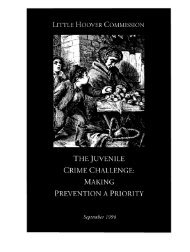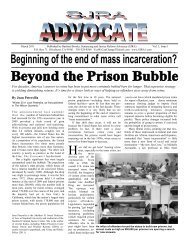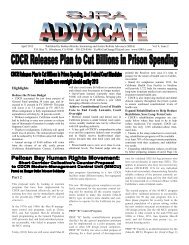Jailhouse Lawyer's Handbook - Sentencing and Justice Reform ...
Jailhouse Lawyer's Handbook - Sentencing and Justice Reform ...
Jailhouse Lawyer's Handbook - Sentencing and Justice Reform ...
You also want an ePaper? Increase the reach of your titles
YUMPU automatically turns print PDFs into web optimized ePapers that Google loves.
number is not on their list of ten permitted<br />
numbers, because it would take prison staff a long<br />
time to do the necessary background checks on<br />
additional numbers. Pope v. Hightower, 101 F.3d<br />
1382 (11th Cir. 1996). This question is not always<br />
just about money though, it also requires the court<br />
to take into consideration whether changing the<br />
regulation would pose a risk to other prisoners or<br />
staff or create a “ripple effect” in the prison.<br />
Fraise v. Terhune, 283 F.3d 506, 520 (3d Cir.<br />
2002).<br />
Are there obvious, easy alternatives to the<br />
regulation that would not restrict your right to<br />
free expression? This part of the test offers a<br />
chance for the prisoner to put forward a suggestion<br />
of an obvious <strong>and</strong> easy way for a prison to achieve<br />
its desired goal. For example, one court held that it<br />
is constitutional to ban correspondence between a<br />
pair of prisoners in two different facilities after one<br />
sent a threatening letter to the other’s<br />
Superintendent, because monitoring their<br />
correspondence is not an obvious or easy<br />
alternative to banning it. U.S. v. Felipe, 148 F.3d<br />
101 (2d Cir. 1998).<br />
You will want to keep these four questions in mind as<br />
you read the following sections on the First<br />
Amendment.<br />
(a) Access to Reading Materials<br />
The Basics: Prison Officials can keep you from getting<br />
or reading books that they think are dangerous or<br />
pornographic. They can also make you get all books<br />
straight from the publisher.<br />
The First Amendment protects your right to receive <strong>and</strong><br />
keep reading material like books <strong>and</strong> magazines. This<br />
doesn’t mean that you can have any books you want.<br />
Your right is limited by the interest of prison officials<br />
in maintaining order <strong>and</strong> security <strong>and</strong> promoting<br />
prisoner rehabilitation. Until 1989, the Supreme Court<br />
required prisons to prove that banning material was<br />
necessary to meet government interests in prison order,<br />
security, <strong>and</strong> rehabilitation before they could violate a<br />
prisoner’s legal rights. This st<strong>and</strong>ard, developed in<br />
Procunier v. Martinez, 416 U.S. 396 (1974), gave<br />
prisoners fairly strong protection of their access to<br />
reading materials. Today, however, the Supreme Court<br />
has become much more conservative, <strong>and</strong> has given<br />
prisons greater power to restrict your First Amendment<br />
rights. Now a prison can keep you from having<br />
Why Read Cases?<br />
Sometimes in this <strong>H<strong>and</strong>book</strong> we suggest that you<br />
read Supreme Court <strong>and</strong> other court cases. While<br />
we have tried to summarize the law for you, the<br />
cases we suggest will give you much more<br />
detailed information, <strong>and</strong> will help you figure out<br />
whether you have a good legal claim. Chapter Six<br />
explains how to find cases in the law library based<br />
on their “citation.” You can also ask the library<br />
clerk for help finding a case. Chapter Six also<br />
gives helpful tips on how to get the most out of<br />
reading a case.<br />
magazines <strong>and</strong> books as long as it fulfills the Turner<br />
test, explained above. This was decided in an important<br />
Supreme Court case called Thornburgh v. Abbot, 490<br />
U.S. 401, 404 (1989). If you feel that your right to<br />
have reading materials is being violated, you should try<br />
reading Thornburgh v. Abbot.<br />
While the Turner st<strong>and</strong>ard is less favorable to<br />
prisoners, it still guarantees you a number of important<br />
rights. Prison officials still need to justify their policies<br />
in some convincing way. If they can’t, the regulation<br />
may be struck down. For example, one court<br />
overturned a ban on all subscription newspapers <strong>and</strong><br />
magazines for prisoners in administrative segregation,<br />
because it meant that prisoners were kept from reading<br />
all magazines, a problem under the second question in<br />
Turner, <strong>and</strong> because the rule wasn’t reasonably related<br />
to the prison’s interested in punishment <strong>and</strong> cleanliness,<br />
a problem under Turner Question 1. Spellman v.<br />
Hopper, 95 F. Supp. 2d 1267 (M.D. Ala., 1999).<br />
Prisons can’t just ban books <strong>and</strong> magazines r<strong>and</strong>omly.<br />
Courts require prisons to follow a certain procedure to<br />
ban a publication. A prison cannot maintain a list of<br />
excluded publications, or decide that no materials from<br />
a particular organization will be allowed in. It must<br />
decide about each book or magazine on a case-by-case<br />
basis. This is true even if prison official already knows<br />
that the book or magazine comes from an organization<br />
they don’t approve of. Williams v. Brimeyer, 116 F.3d<br />
351 (8th Cir. 1997). Also, some prisons require the<br />
warden to tell you when he or she rejects a book or<br />
magazine sent to you, <strong>and</strong> to give the publisher or<br />
sender a copy of the rejection letter. Courts may<br />
require that the prison have a procedure so that you, or<br />
the publisher or sender, can appeal the decision.<br />
Prison officials cannot censor material just because it<br />
contains religious, philosophical, political, social,<br />
sexual, or unpopular or repugnant content. They can<br />
JAILHOUSE LAWYERS HANDBOOK – CHAPTER TWO<br />
12





